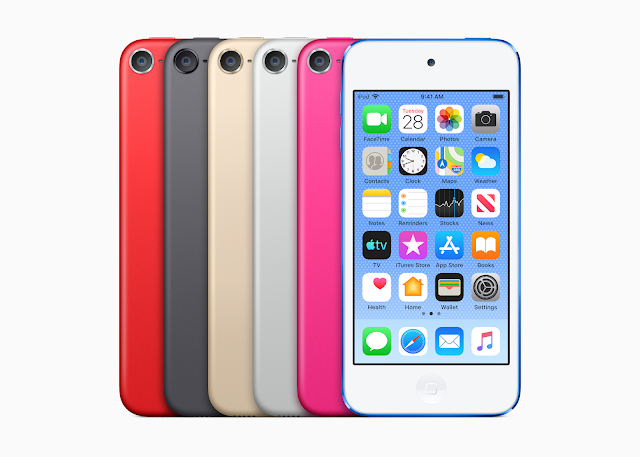In my previous post, I talked about iPods — past and present. In this
post, I will talk about storage issues I've experienced with iPhone compared
to iPod, plus my wrap-up.
When you have a mobile device that’s portable, one that “does it all” like smartphones and tablets, that’s great! However, there’s one thing people forget — storage shared between apps. Your music library has to share storage space with a Photo library, various saved/downloaded Documents, a Calendar, Reminders, Emails, iMessages or SMS messages, Web browsing data and History. It all adds up, along with the system data that those apps may need or create. On a laptop or desktop computer, this made sense as they were designed with a lot of storage and, until the last decade depending who makes your computer, are mostly upgrade-able.
If you're an iTunes/Apple Music user and you store your music in iCloud Music Library and you don’t download, even if you stream via Spotify, those songs you listen to are still most likely being downloaded in the background as you’re listening to them. Otherwise you’d probably get a lot of buffering - stopping and starting. When you finish listening, you’d hope that the system would clear out those temporary files from your device.
In iOS 15, Apple renamed in the iOS/iPadOS storage area's Other as System
Data - system caches, logs and other things currently needed. I’m fine with
that but, how can that be taking up almost half the device storage
which it was doing on my iPhone 8 Plus? I now have a 256GB iPhone 12 Pro
that I’ve had for a year and I hope I don’t see the Storage Full message for
another four or five years at least because I use my iPod for listening to
music.
At the moment, the only thing I know that can clear that clutter is a Factory Restore. Who wants to go through that every time they run out of storage? I certainly don’t fancy it. That's also a temporary solution as it starts building up all over again and quite quickly. A way for the user to clear out unnecessary caches, logs and other things would save a lot of headaches.
That is why I feel Apple should bring back a dedicated hardware audio/video player, so that those of us who want to keep our music & video collections separate from our multi-purpose mobile devices can do so. I'm not saying they should take music/video playback from their other products as they're still good for people who don't constantly utilise music or video libraries.
The Musis Lives On (Apple Photo Link)
I think Apple could do the following, if they launched an iPod replacement audio/video player:
- Re-program the iPod nano 7th Gen’s operating system for today’s usage and rename it musicOS or mediaOS or any other name they fancy (the 7th Generation iPod nano was the only dedicated music/video player that had a multi-touch touchscreen like iPod touch).
- Incorporate Siri (for music, TV, Podcasts search only), Apple Music and Apple TV+ while still keeping the flow and design of that system.
- Keeping Photos support like the old iPod would be okay,
-
Add Wi-Fi and hotspot capabilities so you could add music in the vicinity
of Wi-Fi networks. Cellular would need a plan so that wouldn't be ideal -
why pay out for a plan when you can use Wi-Fi or hotspot to your
phone/tablet?
- Make the screen over 5” and give it 256GB or 512GB storage.
-
At least bring it up to the CPU power of iPhone 11 or 12 - the current and
outgoing iPod touch has the power of iPhone 7 and feels very sluggish and
under-powered.
-
Slim down iOS to just audio/video apps —
maybe rename it as mentioned above.
- Filter the App Store to just focus music and/or video apps (this would also appease those who enjoy 3rd party music apps like Spotify, Tidal or other players),
-
If the device just contains downloaded/purchased content and streaming
content, you shouldn't have to worry about security or privacy as there
wouldn't really be anything to protect other than music or other content.
The way I look at it, iPhone and iPad are both great communication and productivity devices. It's great that they — along with Apple's other products — also play music and video but, why not just have a device similar to iPod for today’s world? Why not call it something like Apple Media Player or Apple Music Player? At least it’d give Apple something to compete against Spotify’s hardware players they appear to be coming out with.
Other Apple products I love to use for music are HomePod (original 2018 version), my iMac and Airpods Pro. I will miss my iPod when it eventually stops. My only other thing when that day comes would be to buy the current cheapest 256GB iPhone and just use that for music only. I doubt Apple would have wanted people to do that. That's why I feel there's a need for a dedicated iPod replacement from Apple.
Farewell iPod brand. I'm sure there'll be people who are sad like me but I
know there are also people who are glad to see it end which also makes me
sad. Those people tend to be the ones who have given up on iPod the day the
iPhone was launched. It's not about nostalgia to me — it's a device I use
and love.







